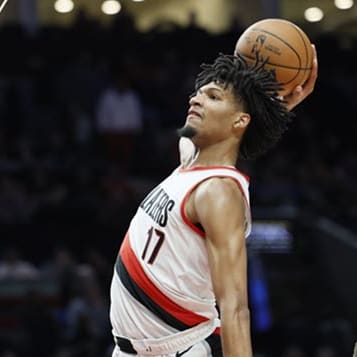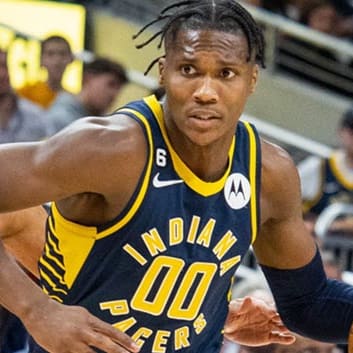This article is part of our NBA Draft series.
Sources! Trades! More sources! Smokescreens! EVEN MORE SOURCES!
The 2015 NBA Draft was supposed to be chaotic. In the week leading up to the draft, depending who you talked to you, just about every team aside from the Timberwolves was rumored to be trying to move up in the first round (even Minnesota ended up trading up later in the draft). But come draft night, none of it materialized. The lottery remained fully intact, and by the end of the night the biggest names on the move were Greivis Vasquez and Mason Plumlee.
Maybe the draft wasn't the thrill ride we hoped for, but nonetheless the NBA welcomed another talented crop of rookies Thursday night. With the dust now settled, which teams came away winners, and which failed to capitalize on an opportunity to add an impact player?
WINNERS
 MINNESOTA TIMBERWOLVES
MINNESOTA TIMBERWOLVESThe Wolves would have really had to try to mess this pick up, but they made the right call in selecting Karl Anthony Towns with the No. 1 pick. He has the highest ceiling of perhaps any player in the draft and projects as an ideal long-term running mate for reigning Rookie of the Year, Andrew Wiggins. With Nikola Pekovic and Gorgui Dieng on the roster, center wasn't exactly an area of need for Minnesota, but Towns is too much of a talent to pass up, and the Wolves will be able to move one of the aforementioned veterans if they so choose.
I loved what Minnesota did later in the first round, sending a pair of second-round picks (No. 31, No. 36) to Cleveland to move up to No. 24 to select Minneapolis-area native Tyus Jones. Jones was by far the best point guard available, and he'll add immediate depth behind Ricky Rubio. The addition of Jones will allow Zach LaVine to spend more time off the ball and take pressure off of Rubio to conduct the offense. Adding depth was also a must, especially considering Rubio's lengthy injury history.
 DENVER NUGGETS
DENVER NUGGETS
All Denver had to do was sit back and wait, but the Nuggets were thrilled to have Emmanuel Mudiay fall into their lap at No. 7. The Dallas prep star, who Brandon Jennings'd in China for a year, is a big guard (6-5) with elite quickness and burst for his frame. The Nuggets are at a bit of a crossroads after taking a major step back in 2014-15, but Mudiay is a face of the franchise-type of player who Denver can construct a roster around. The move likely spells the end of the Ty Lawson era, and it will be interesting to see what the Nuggets will be offered for Lawson in potential deals.
 MIAMI HEAT
MIAMI HEAT
If Mudiay falling to Denver was luck, Justise Winslow dropping to the Heat was divine intervention. Never in Pat Riley's wildest dreams did he expect the Duke swingman to be on the board at No. 10, but things materialized quickly after Detroit took Stanley Johnson over Winslow at No. 8. Charlotte grabbing Frank Kaminsky at No. 9 wasn't a surprise, but you have to wonder how much internal deliberation went on in the Hornets' war room once the Pistons' pick was locked in.
Regardless, Miami was more than happy to select Winslow, who was projected as high as No. 4 to the Knicks in some mock drafts. He's an ideal addition for a team in need of wing help and could help coax Dwyane Wade back to South Beach. Depth will be an issue, but a projected starting five of Dragic-Wade-Winslow-Bosh-Whiteside with Luol Deng as the sixth man should be enough to vault Miami into contender territory in the still-inferior East.
 OKLAHOMA CITY THUNDER
OKLAHOMA CITY THUNDER
The Thunder didn't make a huge splash, but they got the player they've coveted since the start of the draft process, and they didn't have to give anything up to get him. Cameron Payne steps in as the heir apparent to Reggie Jackson, filling an immediate need at backup point guard for a team that relied upon D.J. Augustin after the trade deadline. Payne can play both guard spots and is skilled enough offensively to create his own shot off the dribble or get to the rim. The Thunder already have a number of ball-dominant players, however, so it will be up to Payne to fit into a role in which he's sometimes the third or fourth option, something he wasn't accustomed to at Murray State.
 NEW YORK KNICKS
NEW YORK KNICKS
Whether you like the Porzingis pick or not, it's tough to argue that the Knicks should have gone in another direction. Going with Mudiay or Winslow would have saved a few childrens' tears, but Porzingis was the player with the highest upside, and New York deserves credit for not caving to popular opinion. Of course, the Knicks would have preferred Jahlil Okafor or D'Angelo Russell, but with both off the board at No. 4, Porzingis was the right choice.
LOSERS
 DETROIT PISTONS
DETROIT PISTONSJust when it appeared Justise Winslow was going to fall right into Stan Van Gundy's lap, Detroit provided one of the bigger shocks of the night, selecting Arizona's Stanley Johnson at No. 8. Johnson isn't so much a bad pick by the Pistons, as he is a risky pick, especially compared to Winslow, who figures to develop into, at worst, one of the better defenders in the league at his position. Johnson was a big-time high school prospect with a ton of potential, but he didn't make as much of an impact on a deep Arizona team as most anticipated. His body - 6-7, 242lbs, 6-11 wingspan - may be NBA-ready, but Johnson will require an adjustment period before becoming an impact, rotational player for Van Gundy. Again, it's far too early to start the "Detroit blew this pick" talk, but with Winslow still on the board it was a puzzling decision.
 PHILADELPHIA 76ers
PHILADELPHIA 76ers
The 76ers might have grabbed the best player available at No. 3, but their three (by far) best assets now play the same position. Perhaps the Okafor pick is an indication that Joel Embiid's setback is more severe than Philadelphia is publicly letting on, but even if that is the case, can the Sixers play Okafor and Nerlens Noel together for 30-plus minutes per night? Okafor's ability to score with his back to the basket has elicited comparisons to Tim Duncan, but at this point in his development he's a poor jumpshooter who doesn't space the floor. Noel is an even worse shooter, converting just 12.4 percent of his mid-range attempts (10-16 feet) and 8.4 percent of his attempts from 16-22 feet last season, per Basketball-Reference. With both players on the floor, the Sixers should rebound well, but spacing will be a major issue. Okafor is a big-time future asset, no doubt, but the 76ers have now drafted three straight centers while ignoring arguably even more pressing needs elsewhere.
 MILWAUKEE BUCKS
MILWAUKEE BUCKS
Thought to have significant interest in Bobby Portis and R.J. Hunter, among others, the Bucks' selection of Rashad Vaughn at No. 17 came as somewhat of a surprise. Vaughn, who ranked second in the nation in scoring among freshmen last season, has injury concerns, but he's an athletic, high-upside guard who can create his own shot, something the Bucks noticeably lacked last season after dealing Brandon Knight.
The Vaughn pick was met with mixed reviews, but the reason Milwaukee ended up a loser on draft night was the puzzling decision to acquire Greivis Vasquez from Toronto. With three point guards - Michael Carter-Williams, Jerryd Bayless, Tyler Ennis - already on the roster, Vasquez isn't a natural fit, and his rep as a poor defender doesn't seem to match the identity Milwaukee forged under Jason Kidd last season. Vasquez is a capable shooter with great size - something the Bucks covet - but giving up a second-rounder and a future-first (via LAC) for an overpaid backup felt like a no-win move for a franchise looking to take the next step from surprise playoff team to perennial contender.
 BOSTON CELTICS
BOSTON CELTICS
With two first-round picks and a host of future selections in their back pocket, the Celtics were a team many pegged to make a major move on draft night. Despite Danny Ainge's best efforts, they failed to move up to get Justise Winslow, then took Terry Rozier at No. 16, prompting an onslaught of "Who the [bleep] is Terry Rozier" tweets.
Rozier was one of the best two-way point guards in college basketball last season, but some teams didn't even peg him as a first-round talent, and his skill set is similar to that of Marcus Smart. Granted, it's not like there was a can't-miss prospect available at 16 who Ainge passed up, but the night was generally a disappointment for Boston, which probably could have snagged Rozier at No. 28. Drafting R.J. Hunter with that pick was an excellent value, however.
 INDIANA PACERS
INDIANA PACERS
The Pacers are in an unenviable position this summer, stuck in NBA purgatory between contending and rebuilding. A healthy Paul George should be enough to vault Indiana back into the bottom half of the playoff race in the East, but the frontcourt is in shambles. David West is already camping outside Phil Jackson's office, while Roy Hibbert picked up his option for next season despite the entire state of Indiana pleading with him to opt out.
The Pacers added Texas prospect Myles Turner with 11th overall pick, but the 19-year-old is just that -- a prospect. Maybe Turner develops into the next Chris Bosh, but he could just as easily be Tyrus Thomas. Chances are, he won't be ready to contribute right away for a team built around a star in his prime (George), 29-year-old George Hill and Hibbert, who turns 29 in December. The pick felt like too much of a risk on the Pacers' part, especially with safer, more NBA-ready players like Cameron Payne and Devin Booker still available.
 CLEVELAND CAVALIERS
CLEVELAND CAVALIERS
The Cavaliers missed an opportunity to fill a need by trading back into the second round. Player-coach-GM LeBron James understandably prefers to play alongside fellow veterans, but with Tyus Jones on the board at No. 24, Cleveland had a chance to acquire a young, heady point guard to a roster that all of the basketball world found out is starved for playmakers not named James and Irving. Jones probably wouldn't have been higher than the Cavs' third point guard as a rookie, but he would have been immediate upgrade over Matthew Dellavedova from an offensive standpoint.
Even if the Cavaliers weren't a fan of Jones - GM David Griffin intimates here that they don't believe he's NBA-ready - sharpshooter R.J. Hunter or high-upside swingman Kevon Looney would have been intriguing additions at 24. Free agency is ultimately where Cleveland will retool its roster, but I thought the Cavs passed up an opportunity to add, at the very least, an asset that could be dangled in future trade talks.












